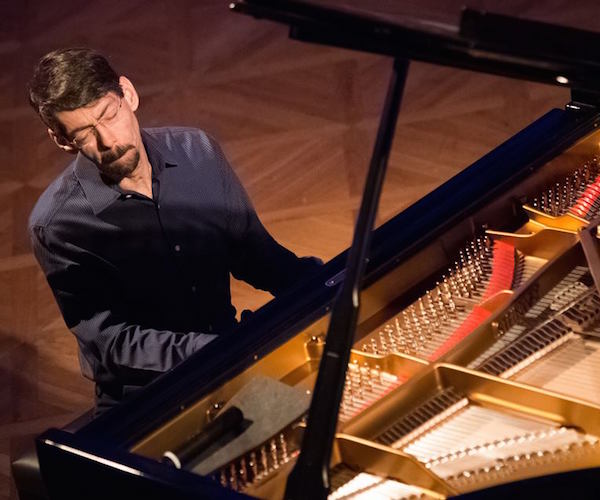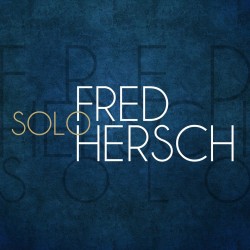Concert Review: Pianist Fred Hersch—A Wonder of a Soloist
Fred Hersch plays with an active, to the point of restless, two-handed style that somehow, despite all its technical variety, sweeps a listener along with its lyrical fervor.
Fred Hersch, performing at Jordan Hall, Boston, MA, on October 29.

Fred Hersch—no matter how frenzied he became, the sound of the piano was consistently gorgeous. Photo: Martin Zeman.
By Michael Ullman
As well as publicizing his new disc, Solo (Palmetto), pianist Fred Hersch’s current tour is meant to celebrate something much more important: his 60th birthday, which was on October 21. He has said that, as a result of his AIDS, he never expected to make it to 40, so this occasion was a testament to survival, an opportunity for grateful nostalgia, as well as musical adventure.
Hersch first stood on Jordan Hall’s stage 40 years ago: his first recording was with a student group led by the late Gunther Schuller performing 1920s arrangements of music by the Paul Whiteman Orchestra. (Some of us heard those concerts, though we little guessed the future distinction of the student pianist.) Brought on at the end of the performance to lead the audience in singing “Happy Birthday” to Hersch, his teacher John Heiss remembered his astonishment at first hearing what he called the young student’s mix of skills and genius.
Today, Hersch’s skills and genius are recognized around the world: he has excelled as a composer, band leader, soloist, and teacher. Hersch taught at New England Conservatory “on and off” for 35 years, resigning last May: his students included two very different but outstanding instrumentalists—Brad Mehldau and Ethan Iverson of The Bad Plus. He has released a disc made up of his through-composed music. More recently, at Jordan Hall Hersch produced a stunning rendition with a student band, along with singers and orchestra, of his settings for selected poems by Walt Whitman. (His haunting, vividly expressive Leaves of Grass can be heard on disc.) Hersch’s disturbing, multimedia event Coma Dreams is a DVD. He’s recorded with his trio, with guitarist Bill Frisell, and at least 10 times as a soloist: many of those solo recordings have been nominated for Grammies.

As a soloist, Hersch is a wonder: he plays with an active, to the point of restless, two-handed style that somehow, despite all its technical variety and adeptness, sweeps a listener along with its lyrical fervor. Even on the ancient “After You’ve Gone” (played at Jordan Hall in memory of his Schuller’s Whiteman concert), a tune that might have drawn him into a consistent left-hand stride, Hersch maintained an infinite variety via his left hand. His approach balances contradictions: he can be simultaneously grandiose and lyrical, playful and romantic. Hersch began his version of Juan Tizol’s “Caravan” with a cluster of notes that he seemed to peck out of the piano. There were no sweeping arpeggios: here he skipped over the keyboard like a man nimbly skimming a rock over water. His version of Joni Mitchell’s lovely song “Both Sides Now” (from her Clouds session) got an entirely different treatment. It began with chime-like notes, the sound of sheets of falling rain. He outlined the melody softly and clearly and then, as if echoing the gradual expansion of Mitchell’s own performance, the pianist became more outgoing until he was excitedly covering the length of the keyboard, before he relapsed into evoking an aura of dreaminess: Mitchell’s lyrics say “It’s life’s illusions I recall.”
The Mitchell tune, Hersch explained, was a tribute to his youth, the late ’60s, when ‘popular music was so good.’ For the same reason he played the Beatles’ “For No One” from the group’s Revolver album. The title seemed ironic on Thursday night: Hersch said that he liked to dedicate songs to individuals, as he did his folksy “Down Home” to Bill Frisell. The song has a kind of cowboy swagger, but the performance ended with a melodramatic upward swirl, like the mule kick of an incoming wave. It ended on a trill high in the treble. For this listener, “When I Heard at Close of Day” from the Walt Whitman poetry cycle was one of the highlights of the evening. Hersch concluded his performance, as he tends to do, with a ballad and a Monk tune. (“The Song is You” and “In Walked Bud”… if I heard correctly.)
The eclectic repertoire for this concert ranged from works by Monk to Antonio Carlos Jobim (“Olha Maria”/”O Grande Amor”), including such Hersch originals as “Whirl,” which is dedicated to the great Balanchine dancer Suzanne Farrell. The line-up even went (briefly) country with the tune “West Virginia Rose.” Hersch’s playing was masterful throughout: no matter how frenzied he became, the sound of the piano was consistently gorgeous. The encore was Hersch’s “Valentine,” another loving gift to the audience.
Michael Ullman studied classical clarinet and was educated at Harvard, the University of Chicago, and the U. of Michigan, from which he received a PhD in English. The author or co-author of two books on jazz, he has written on jazz and classical music for The Atlantic Monthly, The New Republic, High Fidelity, Stereophile, The Boston Phoenix, The Boston Globe, and other venues. His articles on Dickens, Joyce, Kipling, and others have appeared in academic journals. For over 20 years, he has written a bi-monthly jazz column for Fanfare Magazine, for which he also reviews classical music. At Tufts University, he teaches mostly modernist writers in the English Department and jazz and blues history in the Music Department. He plays piano badly.
